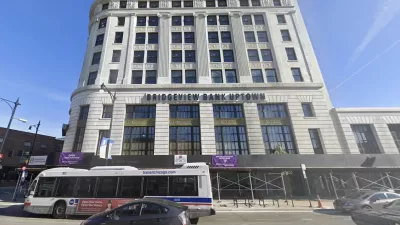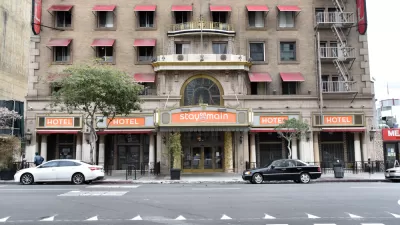Cities with ordinances aimed at making commercial-to-residential conversions easier are reaping the benefits.

The rise of commercial-to-residential conversions in Los Angeles reveals how easing permitting for adaptive reuse can yield positive results, writes Molly Bolan in Route Fifty. “Last year, the city accounted for 12% of the country’s adaptive reuse projects, creating more than 1,200 units, according to a recent report from Yardi Matrix, a commercial real estate research firm.”
Adaptive reuse isn’t new for the City of Angels, Bolan points out. “Los Angeles adopted its first adaptive reuse ordinance in 1999, making it easier for developers to convert underutilized commercial spaces into housing. The policy helped bring 12,000 residential units to the heart of the city.” In 2003, the city expanded the ordinance to include more neighborhoods outside of downtown, but large parts of the city still fall outside its purview, and only buildings built before 1975 are eligible.
Now, “City officials are looking to change that. A proposed update would expand the ordinance to cover the entire city, as well as reduce minimum unit size requirements and eliminate minimum parking requirements for projects within a half-mile of a major public transit stop.” The proposed update would apply to any building over 15 years old.
Bolan adds another example from a much smaller community: Kissimmee, Florida was home to 6 percent of the nation’s conversions last year, with hotels and motels accounting for a large part of this number. Because of the area’s tourist-commercial zoning rules, “developers don’t have to navigate a rezoning process and aren’t subject to public hearings.”
FULL STORY: How cutting red tape can encourage housing conversions

Planetizen Federal Action Tracker
A weekly monitor of how Trump’s orders and actions are impacting planners and planning in America.

San Francisco's School District Spent $105M To Build Affordable Housing for Teachers — And That's Just the Beginning
SFUSD joins a growing list of school districts using their land holdings to address housing affordability challenges faced by their own employees.

The Tiny, Adorable $7,000 Car Turning Japan Onto EVs
The single seat Mibot charges from a regular plug as quickly as an iPad, and is about half the price of an average EV.

Seattle's Plan for Adopting Driverless Cars
Equity, safety, accessibility and affordability are front of mind as the city prepares for robotaxis and other autonomous vehicles.

As Trump Phases Out FEMA, Is It Time to Flee the Floodplains?
With less federal funding available for disaster relief efforts, the need to relocate at-risk communities is more urgent than ever.

With Protected Lanes, 460% More People Commute by Bike
For those needing more ammo, more data proving what we already knew is here.
Urban Design for Planners 1: Software Tools
This six-course series explores essential urban design concepts using open source software and equips planners with the tools they need to participate fully in the urban design process.
Planning for Universal Design
Learn the tools for implementing Universal Design in planning regulations.
Smith Gee Studio
City of Charlotte
City of Camden Redevelopment Agency
City of Astoria
Transportation Research & Education Center (TREC) at Portland State University
US High Speed Rail Association
City of Camden Redevelopment Agency
Municipality of Princeton (NJ)





























